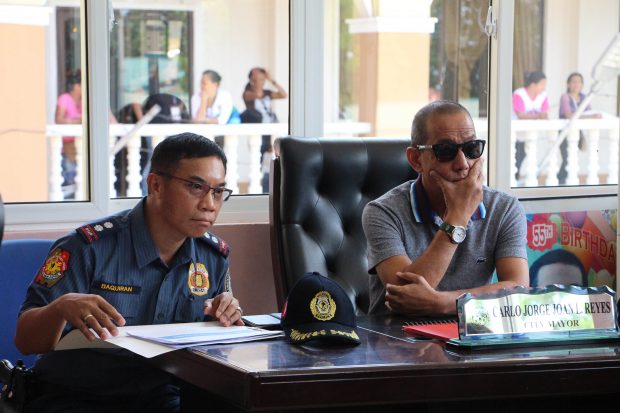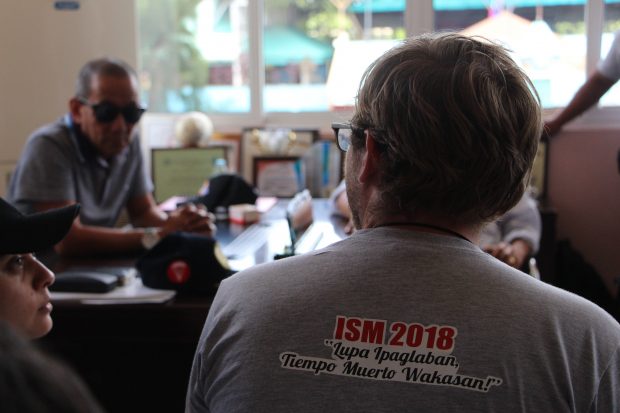Magsasaka sa Negros, itinuro ang militar sa mga pagpatay
Ni Jo Maline D. Mamangun
Lungsod ng Bacolod—Nagharap ang mga magsasaka at mga lokal na opisyal ng Guihulngan City, Negros Oriental noong Miyerkules, July 18, kaugnay sa mga pagpatay sa naturang bayan mula pa noong Oktubre 2010.
Bilang bahagi ng isinasagawang International Solidarity Mission hinggil sa mga paglabag sa karapatang pantao sa ilalim ng gubyerno ni Rodrigo Duterte, nag-usap ang grupo ng mga magsasaka na KAUGMA-ON (Kapunongan alang sa Ugma sa Gagmay nga Mag-uuma sa Oriental Negros) at Guihulngan City Mayor Carlo Reyes sa tanggapan ng huli.
Inireklamo rin ng mga magsasaka ang malalakihang operasyong militar sa kanilang mga pamayanan sa ilalim ng “Oplan Kapayapaan” ng pamahalaan na anila’y nagdudulot ng takot sa mga mamamayan.
Ayon sa kanila, walang tigil ang militar sa pang-uupat (harassment), pagsasampa ng gawa-gawang kaso at mga extra-judicial killings sa mga lider at miyembro ng nasabing organisasyon.
Ayon sa KAUGMA-ON, may 23 kaso ng extra-judicial killing sa kanilang lugar simula noong 2016.

Chief of Police Baquiran (left) and Mayor Reyes (right). (Photo by JoMaline Diones-Mamangun)
Subalit itinanggi ni Reyes na may nalalaman siya sa mga pagpatay.
“You’re talking about killings in Guihulngan. Wala akong alam diyan. Only the PNP can answer your question,” ani Reyes sa mga magsasaka.
Dagdag ng alkalde na, ayon sa mga naririnig daw niya, ang mga namamaril ay pawang naka-bonet o naka-helmetkung kaya mahirap makapagtukoy ng pinaghihinalaan ang pulisya.
Ayon naman kay Guihulngan Police officer-in-charge Mario Baquiran na 44 na araw pa lamang siya sa kanyang destino at inaaral niya pa lamang ang mga naitalang pagpatay.
“It’s very hard for us in conducting these investigations because we could not just identify them,” ani ng hepe.
Ngunit ayon sa Unyon ng mga Manggagawa sa Agrikultura (UMA), tanging ang militar ang nagkakainteres na dahasin ang mga magsasaka dahil sa kanilang paglaban na magkaroon ng sariling lupa.
Ikinwento ni John Milton Lozande, Secretary General ng UMA, ang kaso ng brutal na pagpatay kina Endric and Rosalie Calago noong Mayo 2015 na namatay matapos pagbabarilin ang kanilang bahay ng mga pinaghihinalaang sundalo ng 11th Infantry Battalion.
“Merong mga circumstances, circumstantial happenings na nagtuturo sa militar sa pagpatay sa biktimang ito,” ani Lozande.

(Photo by JoMaline Diones-Mamangun)
Dagdag ng lider-magsasaka, mahihirapan ngang mag-imbestiga ang pulisya kung ang militar ang nasa likod ng mga pagpatay.
Siniguro ni Baquiran na ipakukulong niya maging ang mga sundalo kung mapatunayang ang mga ito ang naghahasik ng takot sa mamamayan ng Guihulngan/
Nagkasundo ang mga magsasaka at ang mga opisyal ng lokal na pamahalaan na magsasagawa ng ibayong dayalogo upang maisiwalat ang iba pang kaso ng paglabag sa karapatang pantao sa naturang bayan.
Kasali ang mga magsasaka, taong-simbahan, misya at iba pang sektong sa naturang ISM na may panawagang “Save Life, Save Guihulngan.” #
